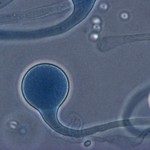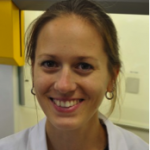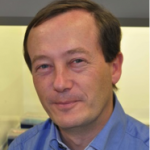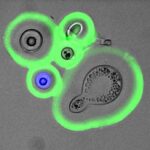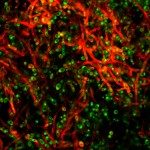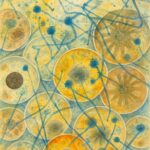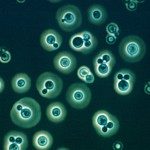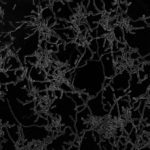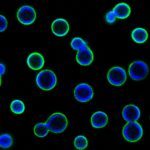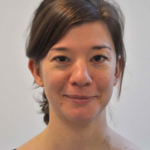The translational mycology group is headed by Prof. Alexandre Alanio, MD, PHD. This research group aims at bridging basic research on fungal physiology, diagnosis and clinical management of patients with fungal infections (invasive or superficial). In terms of basic mycology, we focus on the heterogeneity of Cryptococcus populations and how C. neoformans adapt to specific environments and change its metabolism (dormant cells, VBNC) and morphology (Titan cells). We currently use global transcriptome analysis and fluorescent dyes and flow cytometry/sorting to characterize subpopulations of yeasts. We recently developed models and tools to study persistence of C. neoformans upon exposure to fungicidal concentrations of amphotericin B. On the diagnostic side, we are developing molecular tools allowing early diagnosis for superficial and invasive fungal infections (aspergillosis, mucormycosis, fusariosis, candidiasis, deep pheohyphomycosis) including endemic mycoses (histoplasmosis, coccidioidomycosis, sporotrichosis, paracoccidioidomycoses, blastomycosis, talaromycosis). We are also testing new diagnostic tools in mycology by implementing international studies and using relevant cohort of patients/samples. In parallel we train the front-line health care workers (clinicians, scientists and laboratory technicians) in Sub-Saharan Africa to improve the diagnostic of fungal infections and thus the outcome of the patients. We are developing new tools to describe the mycobiota and new diagnostic processes to detect fungal pathogens using new generation sequencing. On the clinical side, we are interested in describing new underlying diseases/group of patients at risk of invasive fungal infections (acquired and genetic disorders), optimizing new regimens and duration of treatment, describing the epidemiology and delineating new nosological entities based on well phylogenically described isolates and clinical diseases.
Members
Courses
Pasteur Course Medical mycology
This four-week course is designed for microbiologists (MDs, PharmDs, PhDs, and veterinarians) seeking to stay up-to-date with the latest advancements in diagnostic and identification techniques, as well as therapeutic approaches for fungal infections. For […]
2025-03-24 09:00:00
2025-04-18 18:00:00
Europe/Paris
Pasteur Course Medical mycology
This four-week course is designed for microbiologists (MDs, PharmDs, PhDs, and veterinarians) seeking to stay up-to-date with the latest advancements in diagnostic and identification techniques, as well as therapeutic approaches for fungal infections. For […]
Institut Pasteur, Rue du Docteur Roux, Paris, France
MOOC Medical Mycology
Welcome to the fascinating world of fungi, agents of major infectious diseases! The MOOC is directed by Dea GARCIA-HERMOSO and Olivier LORTHOLARY ==> Registration on: https://www.fun-mooc.fr/en/courses/medical-mycology/ At the end of this course, you […]
2023-09-30 08:00:00
2026-09-29 23:00:00
Europe/Paris
MOOC Medical Mycology
Welcome to the fascinating world of fungi, agents of major infectious diseases! The MOOC is directed by Dea GARCIA-HERMOSO and Olivier LORTHOLARY ==> Registration on: https://www.fun-mooc.fr/en/courses/medical-mycology/ At the end of this course, you […]
Institut Pasteur, Rue du Docteur Roux, Paris, France
Fundings
Publications
Download-
2025Gender differences in audience participation at infectious disease and microbiology conferences: a prospective observational study., Clin Microbiol Infect 2025 Nov; (): .
-
2025Yeast fungaemia among injection drug users in France (2012-2022): a cross-sectional observational study., Lancet Reg Health Eur 2025 Aug; 55(): 101365.
-
2025Weekly Screening of Circulating Mucorales DNA and early treatment in Severely Burned Patients Improves Survival: Real-Life Bi-center Experience in France., Clin Infect Dis 2025 Jul; (): .
-
2025Comparison of MALDI-TOF MS instruments and databases for the identification of uncommon yeasts, Aspergillus spp. and rare filamentous fungi., J Clin Microbiol 2025 Jun; 63(6): e0161224.
-
2024Dynamics of Histoplasma fungal load in people living with HIV with disseminated histoplasmosis under treatment with liposomal amphotericin B., Clin Microbiol Infect 2024 Dec; (): .
-
2024Reappraising Cladophialophora bantiana phaeohyphomycosis in France: retrospective nation-based study., Lancet Microbe 2024 Oct; (): 100907.
-
2024Features of cryptococcosis among 652 HIV-seronegative individuals in France: a cross-sectional observational study (2005-2020)., Clin Microbiol Infect 2024 Mar; (): .
-
2024Development and validation of quantitative PCR assays for HIV-associated cryptococcal meningitis in sub-Saharan Africa: a diagnostic accuracy study, The Lancet Microbe.
-
2023Kicking sleepers out of bed: Macrophages promote reactivation of dormant Cryptococcus neoformans by extracellular vesicle release and non-lytic exocytosis., PLoS Pathog 2023 Nov; 19(11): e1011841.
-
2023Reduction in mortality from HIV-related CNS infections in routine care in Africa (DREAMM): a before-and-after, implementation study., Lancet HIV 2023 Oct; 10(10): e663-e673.
-
+View full list of publications

